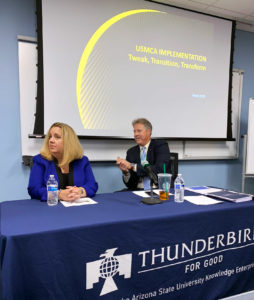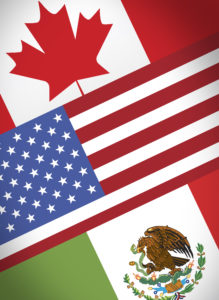News & Insights
BIS Adds Huawei and Its Non-U.S. Affiliates to the Entity List, Provides Relief in the Form of a Temporary General License
If you are a U.S. or non-U.S. supplier of hardware, software or technologies that are subject to the U.S. Export Administration Regulations beware: On May 16th, the Commerce Department’s Bureau of Industry and Security (“BIS”) added Huawei Technologies Co., Ltd. (“Huawei”) and 68 of its non-U.S. affiliates, to the Entity List. Shortly thereafter, on May 20th, a 90-day reprieve was granted in the form of a Temporary General License which authorizes certain exports, reexports and in-country transfers to the Huawei entities.
For over a year now, we have heard rumblings of a U.S. Government investigation of Huawei. The dramatic step taken to add the Huawei companies to the Entity List resulted from a finding that Huawei has acted contrary to U.S. national security and foreign policy objectives. Huawei was recently indicted in the United States for selling goods, technology and services to Iran in violation of U.S. sanctions, and it has been reported that Huawei and its affiliates took part in deceptive and obstructive acts to evade U.S. laws—acts that apparently led to the decision to add not only Huawei but 68 of its non-U.S. affiliates to the Entity List as well.
What Huawei’s Entity List Designation Means for U.S. and Non-U.S. Companies
Huawei, headquartered in China, is the largest telecommunications equipment producer in the world. By adding Huawei to the Entity List, the U.S. will cut off Huawei’s ability to purchase U.S.-origin parts, components, software and technology to support its own products. Parties are added to the Entity List when the U.S. believes they are involved, or pose a significant risk of being involved, in activities that offend U.S. national security or foreign policy interests. Once a party has been added to the Entity List, U.S. and non-U.S. suppliers are prohibited from exporting, reexporting or transferring (in-country) any item that is subject to the EAR to them without a BIS license—typically, applications for such licenses will be denied. An item is “subject to the EAR” if it is in the United States, is U.S. origin (wherever located), is made outside the United States and contains more than de minimis amounts of controlled U.S. content, or is a direct product of U.S. technology or software. Even items that are classified as EAR99, eligible for No License Required (NLR) or otherwise eligible for an EAR license exception are prohibited from being exported to an Entity List party without a license from the BIS.
The 90-Day Reprieve
As noted above, on May 20th, the BIS rolled out a 90-day Temporary General License that partially restores the ability of U.S. and non-U.S. suppliers to engage in certain transactions with Huawei despite the Entity List restrictions. See 84 Federal Register 23468 (May 22, 2019). From May 20th to August 19th, companies may export, reexport, or transfer items to Huawei and its non-U.S. affiliates provided that those activities involve—
• Transactions necessary to maintain and support existing and currently fully operational networks and equipment, including software updates and patches, subject to legally binding contracts and agreements executed between Huawei and third parties or the non-U.S. Huawei affiliates and third parties;
• Transactions necessary to provide service and support, including software updates or patches, to existing Huawei handsets that were available to the public on or before May 16, 2019;
• Disclosures to Huawei and the non-U.S. Huawei affiliates of information regarding security vulnerabilities in items owned, possessed or controlled by Huawei or the affiliates when related to the process of providing ongoing security research critical to maintaining the integrity and reliability of existing and currently fully operational networks and equipment, as well as handset; or,
• Engagements with Huawei and/or its non-U.S. affiliates for the development of 5G standards as part of a duly recognized international standards body (e.g., IEEE, IETF, ISO, ITU, ETSI, 3GPP, TIA, and GSMA).
If an export, reexport or transfer relates to any one of the activities described above, then they will be subject to the same licensing requirements that were in effect prior to the Huawei companies’ inclusion on the Entity List. (Keep in mind that the licensing requirements triggered under other parts of the EAR still remain in effect.)
The Temporary General License will last until August 19th, 2019—but if the ZTE case is in any indication, it is possible that the BIS will also choose to extend the Temporary General License in this case beyond that deadline as well.
Certification Statement Requirements
Where a proposed transaction involving Huawei is authorized by the BIS’ Temporary General License, companies are required to issue written certifications describing how that particular transaction qualifies for, and falls within the scope of, the Temporary General License. These certification statements must also be maintained in accordance with the EAR’s record retention requirements, and provided to the BIS upon request.
Next Steps
Both U.S. and non-U.S. companies whose supply chains involve Huawei or its affiliates are urged to carefully review the BIS Federal Register notices, as well as their current or proposed projects involving Huawei to confirm whether the Temporary General License can be used. Of course, companies should immediately cease activities involving the Huawei entities where they do not fall within the scope of the Temporary General License. For transactions covered by the Temporary General License, companies should issue the required written certification statements and maintain them as part of their export recordkeeping protocols. Companies should also continue monitoring this situation closely, especially keeping tabs on whether the Temporary General License will be extended beyond August 19th, modified or even terminated altogether.
If you have any questions pertaining to Huawei’s inclusion on the Entity List, export controls or other international trade issues, please contact Melissa Proctor (melissa@millerproctorlaw.com) at Miller Proctor Law PLLC (https:www.millerproctorlaw.com).
News & Insights

Around the World with Trade Deals – Global Chamber® and the Thunderbird School of Global Management
On March 5, 2020, the Global Chamber® and the Thunderbird School of Global Management hosted the seminar and globinar “Around the World with Trade Deals” at Thunderbird’s headquarters in downtown Phoenix. The event featured an expert panel on free trade

Chicken or Chess? The Games Continue: Increased U.S. Tariffs and Retaliation by Key Trading Partners
In March of this year, the U.S. imposed increased tariffs on certain steel and aluminum products imported into the United States from all countries for national security reasons in response to an investigation conducted by the Commerce Department’s Bureau of


